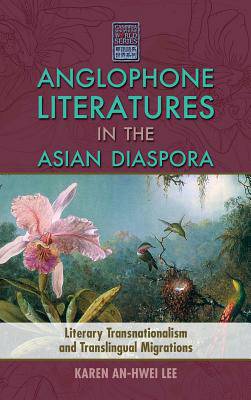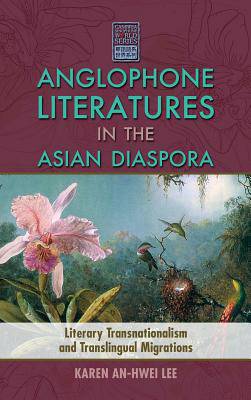
Je cadeautjes zeker op tijd in huis hebben voor de feestdagen? Kom langs in onze winkels en vind het perfecte geschenk!
- Afhalen na 1 uur in een winkel met voorraad
- Gratis thuislevering in België vanaf € 30
- Ruim aanbod met 7 miljoen producten
Je cadeautjes zeker op tijd in huis hebben voor de feestdagen? Kom langs in onze winkels en vind het perfecte geschenk!
- Afhalen na 1 uur in een winkel met voorraad
- Gratis thuislevering in België vanaf € 30
- Ruim aanbod met 7 miljoen producten
Zoeken
Anglophone Literatures in the Asian Diaspora
Literary Transnationalism and Translingual Migrations
Karen An-Hwei Lee
€ 100,95
+ 201 punten
Omschrijving
This book is in the Cambria Sinophone World Series (general editor: Victor H. Mair). Conversant in critical and creative modes of thought, this book examines the uses of translation in Asian and Anglophone literatures to bridge discontinuous subjectivities in Eurasian transnational identities and translingual hybridizations of literary Modernism. Anglophone Literatures in the Asian Diaspora: Literary Transnationalism and Translingual Migrations focuses on the roles of mysticism and language in Dictée's poetic deconstruction of empire, engaging metaphysical issues salient in the history of translation studies to describe how Theresa Cha and four other authors--Sui Sin Far, Chuang Hua, Kazuo Ishiguro, and Virginia Woolf--used figurative and actual translations to bridge discontinuous subjectivities. The author Karen Lee's explorations of linguistic politics and poetics in this eclectic group of writers concentrates on the play of innovative language deployed to negotiate divided or multiple consciousness. Over the past decade, emerging scholarship on transnationalism and writers of Asian heritage has focused primarily on diasporic Asian literary production on American soil. For instance, Rachel Lee's seminal publication, The Americas of Asian American Literature: Gendered Fictions of Nation and Transnation (1999), examines how Asian American feminist literary criticism is shaped by global-local influences in the United States. Additionally, Transnational Asian American Literature: Sites and Transits (2006), edited by Shirley Lim, et al., explores the transnational aspects of Asian literature in America, analyzing a discursive globalized imaginary as American writers Asian of heritage move within and across national boundaries. Following Lim's anthology, Lan Dong's Transnationalism and the Asian American Heroine (2010) concerns the representations of women transposed from Asian oral traditions of "women warriors" to the United States. However, less scholarship on the Anglophone literatures of Asia and the Americas has focused on Asian writers within broader comparative frameworks of global perspectives outside Asian American literature and in comparison to Asian British literature, or aside from the parameters of specific Asia-to-America tropes such as the aforementioned "woman warrior," as in Sheng-mei Ma's Immigrant Subjectivities in Asian American and Asian Diaspora Literatures (1998), or Kandice Chuh and Karen Shimakawa's Orientations: Mapping Studies in the Asian Diaspora (2001). Uniquely situated among these discussions, Lee's book extends current lines of inquiry by including the oeuvres of diasporic Asian writers in Asia, America, and abroad, presenting their works within the contexts of transnationalism via the dual lenses of translation and translingual migration. As new scholarship, this book foregrounds literary transnationalism and translingual migrations in a context of East to West as a study of representative Anglophone literatures in the Asian diaspora. Anglophone Literatures in the Asian Diaspora: Literary Transnationalism and Translingual Migrations is highly relevant to university teaching audiences in postcolonial literature, Asian American studies, Anglophone writers of the Asian diaspora, cultural feminism, Eurasian studies, and translation studies.
Specificaties
Betrokkenen
- Auteur(s):
- Uitgeverij:
Inhoud
- Aantal bladzijden:
- 308
- Taal:
- Engels
- Reeks:
Eigenschappen
- Productcode (EAN):
- 9781604978605
- Verschijningsdatum:
- 26/09/2013
- Uitvoering:
- Hardcover
- Formaat:
- Genaaid
- Afmetingen:
- 152 mm x 229 mm
- Gewicht:
- 621 g

Alleen bij Standaard Boekhandel
+ 201 punten op je klantenkaart van Standaard Boekhandel
Beoordelingen
We publiceren alleen reviews die voldoen aan de voorwaarden voor reviews. Bekijk onze voorwaarden voor reviews.









